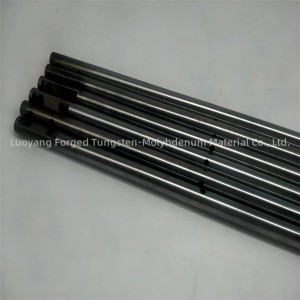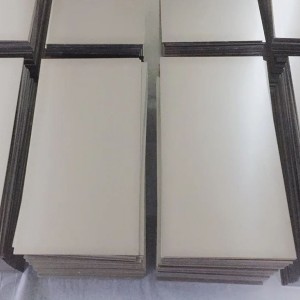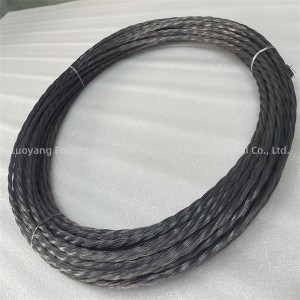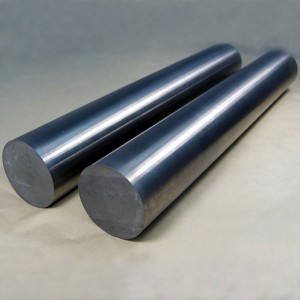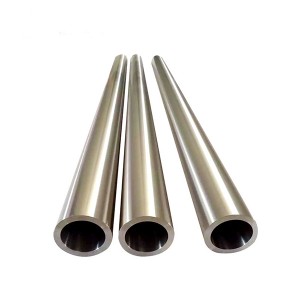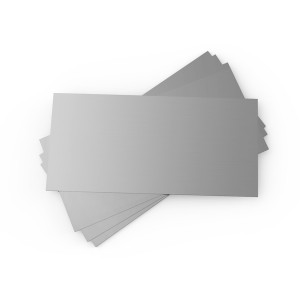heavy alloy tungsten threaded electrode High hardness and density
The production of tungsten threaded electrodes involves several key steps to ensure a high-quality, durable product. The following is an overview of typical production methods for tungsten threaded electrodes:
1. Raw material selection: The process starts with selecting high-quality tungsten raw materials. Tungsten is known for its exceptional hardness and high melting point, making it ideal for threaded electrodes where durability and heat resistance are required.
2. Powder preparation: Process the selected tungsten raw materials into fine powder through hydrogen reduction or ammonium paratungstate (APT) reduction. This powder is the main material for the production of threaded electrodes.
3. Mixing and compacting: Tungsten powder is mixed with other alloying elements to obtain desired properties, such as increased hardness and density. The mixed powder is then pressed into the desired shape using high-pressure compaction techniques such as cold isostatic pressing (CIP) or molding.
4. Sintering: The compacted tungsten powder is subjected to a high-temperature sintering process in a controlled atmosphere (usually in a vacuum or hydrogen environment). Sintering helps bind the tungsten particles together to form a dense and strong structure.
5. Machining and threading: After sintering, the tungsten material is machined to final size and threaded to form the desired electrode shape. Precision machining technology is used to ensure the accuracy of thread features.
6. Surface treatment: Threaded electrodes can undergo surface treatments such as grinding, polishing or coating to enhance their performance as well as wear and corrosion resistance.
7. Quality Control: Throughout the production process, quality control measures are implemented to ensure that threaded electrodes meet the required hardness, density, dimensional accuracy and other key parameter specifications.
By following these production steps, manufacturers can produce tungsten threaded electrodes with high hardness, density and durability, making them suitable for demanding applications in industries such as welding, metalworking and electrical discharge machining (EDM).
Tungsten threaded electrodes are used in a variety of industrial processes due to their high hardness, density and durability. Some common applications include:
1. Resistance welding: Tungsten threaded electrodes are used in the resistance welding process as contact points to conduct current and generate heat to connect metal parts. Tungsten's high hardness and heat resistance make it suitable for withstanding the high temperatures and mechanical stresses encountered in resistance welding operations.
2. Electric Discharge Machining (EDM): In EDM, tungsten threaded electrodes are used as tool components for shaping and machining conductive materials. Tungsten’s hardness and wear resistance make it an excellent choice for producing complex precision machined parts via the EDM process.
3. Spark corrosion: Tungsten threaded electrodes are used in spark corrosion or molding processes as electrode materials for creating complex shapes and features on metal workpieces. Tungsten's high density and thermal conductivity enable efficient material removal and precise machining in spark erosion applications.
4. Metal Forming and Stamping: Tungsten threaded electrodes are used in metal forming and stamping operations to help form, punch or cut metal sheets and components. Tungsten's hardness and durability make it suitable for withstanding the mechanical forces involved in the metal forming process.
5. Glass and Ceramic Processing: Tungsten threaded electrodes are also used in glass and ceramic processing applications for drilling, cutting or shaping of these brittle materials. Tungsten's hardness and wear resistance make it ideal for precision machining in the glass and ceramics industries.
6. Aerospace and Defense: Tungsten threaded electrodes are used in a variety of manufacturing and maintenance processes in the aerospace and defense sectors, including welding, machining and metal fabrication, which require high performance and durable tool components.
Overall, the high hardness, density, and durability of tungsten threaded electrodes make them well suited for a variety of industrial applications, especially processes involving high temperatures, mechanical stress, and precision machining requirements.
| Product Name | Tungsten Threaded Electrode |
| Material | W1 |
| Specification | Customized |
| Surface | Black skin, alkali washed, polished. |
| Technique | Sintering process, machining |
| Meltng point | 3400℃ |
| Density | 19.3g/cm3 |
Wechat:15138768150
WhatsApp: +86 15236256690
E-mail : jiajia@forgedmoly.com






